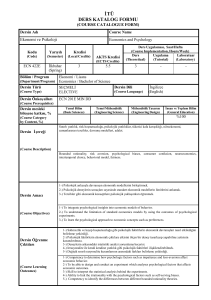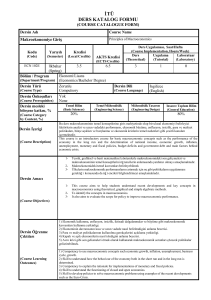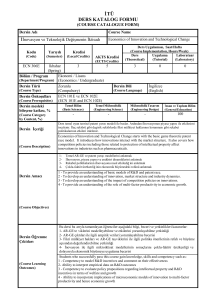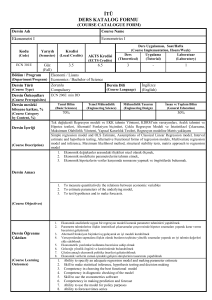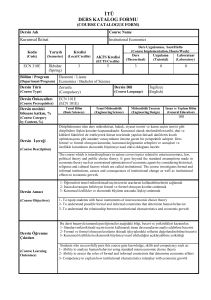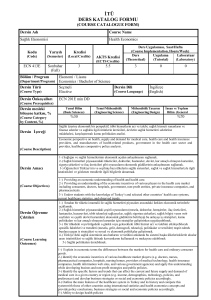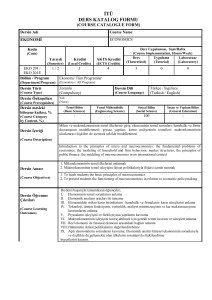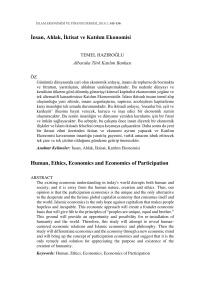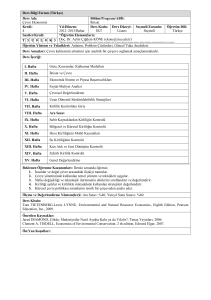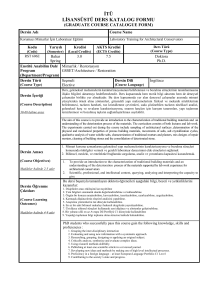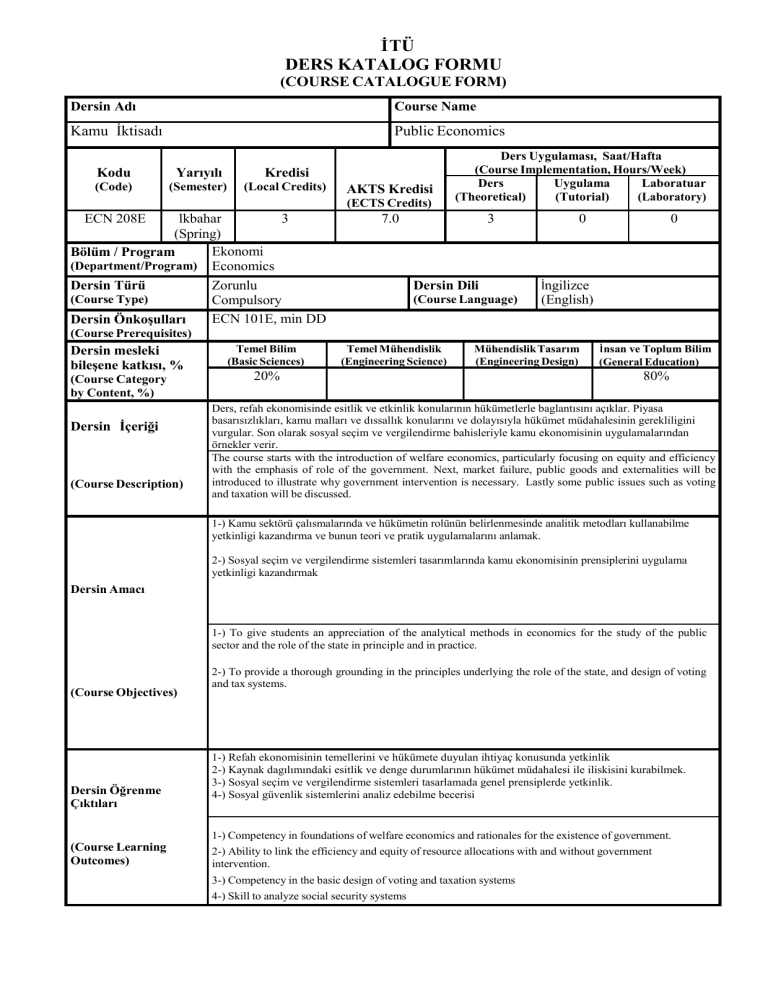
İTÜ
DERS KATALOG FORMU
(COURSE CATALOGUE FORM)
Dersin Adı
Course Name
Kamu İktisadı
Public Economics
Kodu
Yarıyılı
Kredisi
(Code)
(Semester)
(Local Credits)
AKTS Kredisi
(ECTS Credits)
ECN 208E
3
lkbahar
(Spring)
Ekonomi
Bölüm / Program
(Department/Program) Economics
Zorunlu
Dersin Türü
(Course Type)
Compulsory
ECN 101E, min DD
Dersin Önkoşulları
Ders Uygulaması, Saat/Hafta
(Course Implementation, Hours/Week)
Ders
Uygulama
Laboratuar
(Theoretical)
(Tutorial)
(Laboratory)
7.0
3
Dersin Dili
(Course Language)
0
0
İngilizce
(English)
(Course Prerequisites)
Dersin mesleki
bileşene katkısı, %
(Course Category
by Content, %)
Dersin İçeriği
(Course Description)
Temel Bilim
(Basic Sciences)
Temel Mühendislik
(Engineering Science)
Mühendislik Tasarım
(Engineering Design)
20%
İnsan ve Toplum Bilim
(General Education)
80%
Ders, refah ekonomisinde esitlik ve etkinlik konularının hükümetlerle baglantısını açıklar. Piyasa
basarısızlıkları, kamu malları ve dıssallık konularını ve dolayısıyla hükümet müdahalesinin gerekliligini
vurgular. Son olarak sosyal seçim ve vergilendirme bahisleriyle kamu ekonomisinin uygulamalarından
örnekler verir.
The course starts with the introduction of welfare economics, particularly focusing on equity and efficiency
with the emphasis of role of the government. Next, market failure, public goods and externalities will be
introduced to illustrate why government intervention is necessary. Lastly some public issues such as voting
and taxation will be discussed.
1-) Kamu sektörü çalısmalarında ve hükümetin rolünün belirlenmesinde analitik metodları kullanabilme
yetkinligi kazandırma ve bunun teori ve pratik uygulamalarını anlamak.
2-) Sosyal seçim ve vergilendirme sistemleri tasarımlarında kamu ekonomisinin prensiplerini uygulama
yetkinligi kazandırmak
Dersin Amacı
1-) To give students an appreciation of the analytical methods in economics for the study of the public
sector and the role of the state in principle and in practice.
(Course Objectives)
Dersin Öğrenme
Çıktıları
2-) To provide a thorough grounding in the principles underlying the role of the state, and design of voting
and tax systems.
1-) Refah ekonomisinin temellerini ve hükümete duyulan ihtiyaç konusunda yetkinlik
2-) Kaynak dagılımındaki esitlik ve denge durumlarının hükümet müdahalesi ile iliskisini kurabilmek.
3-) Sosyal seçim ve vergilendirme sistemleri tasarlamada genel prensiplerde yetkinlik.
4-) Sosyal güvenlik sistemlerini analiz edebilme becerisi
1-) Competency in foundations of welfare economics and rationales for the existence of government.
(Course Learning
Outcomes)
2-) Ability to link the efficiency and equity of resource allocations with and without government
intervention.
3-) Competency in the basic design of voting and taxation systems
4-) Skill to analyze social security systems
Ders Kitabı
Hindriks J., and Myles G. D., Intermediate Public Economics, MIT Press, 2006.
(Textbook)
(Other References)
Stiglitz J. E., Economics of the Public Sector, Norton & Company, 2010
Gruber J., Public Finance and Public Policy, 3rd edition, Worth, 2010.
Ödevler ve Projeler
8 problem sets and 2 quizzes
Diğer Kaynaklar
(Homework & Projects
Laboratuar Uygulamaları
(Laboratory Work)
Bilgisayar Kullanımı
(Computer Use)
Diğer Uygulamalar
(Other Activities)
Baş arı Değerlendirme
Sistemi
(Assessment Criteria)
Faaliyetler
(Activities)
Yıl içi Sınavları
(Midterm Exams)
Kısa Sınavlar
(Quizzes)
Ödevler
(Homework)
Projeler
(Projects)
Dönem Ödevi/Projesi
(Term Paper/Project)
Laboratuar Uygulaması
(Laboratory Work)
Di er Uygulamalar
(Other Activities)
Final Sınavı
(Final Exam)
Adedi
(Quantity)
1
Değerlendirmedeki Katkısı, %
(Effects on Grading, %)
25
2
10
8
20
1
45
DERS PLANI
Hafta
1
2
3
4
5
6
7
8
9
10
11
12
13
14
Konular
Kamu iktisadına giriş
Denge, etkinlik ve hükümetin rolü
Sosyal seçim ve politik iktisat
Refah ekonomisi: eş itlik ve denge
Kamu malları
Dışsallık
Eksik rekabet
Asimetrik bilgi
Seçim sistemleri
Eş itlik ve dağıtım
Vergilendirmeye giri
Vergilendirme ve ekonomik etkinlik
Optimal vergilendirme
Sosyal güvenlik
Dersin
Çıktıları
1
2
1,3
1,2
1,2
1,2
2
2
3
2,4
1,2
2
2
4
COURSE PLAN
Weeks
1
2
3
4
5
6
7
8
9
10
11
12
13
14
Topics
An introduction to public economics
Equilibrium, efficiency, and the role of the state
Public choice and political economics
Welfare economics: efficiency versus equity
Public goods
Externalities
Imperfect competition
Asymmetric information
Voting systems
Equity and distribution
An introduction to taxation
Taxation and economic efficiency
Optimal taxation
Social security
Course
Outcomes
1
2
1,3
1,2
1,2
1,2
2
2
3
2,4
1,2
2
2
4
Dersin Ekonomi Lisans Programıyla İlişkisi
Katkı
Seviyesi
1 2 3
x
Programın mezuna kazandıracağı bilgi ve beceriler (programa ait çıktılar)
a
b
c
d
e
f
g
h
Ekonomik ve sosyal problemleri, temsili aktörlerin amaç fonksiyonlarını bir takım kısıtlara tabi
olarak maksimize ettikleri ve buna baglı olarak çesitli tarz dengelerin olustugu ortamlar seklinde
matematiksel olarak modelleyen iktisadi yaklasımda yetkinlik.
Mikroiktisadi fiyat sistemini özel ve kamu malları ve uluslar arası ticaret baglamında ögrenip is
stratejileri ve kamu politikaları tasarımında etkinlik ve esitlik dengesini gözeterek hukuk
çerçevesinde kullanabilme yetkinligi. Bulguları Türkçe veya İngilizce olarak ifade edebilmek..
Fiyatların genel düzeyi, işsizlik ve çıktı düzeyine iliş kin temel makroekonomik modelleri inşa
edebilme kabiliyeti. Bulguları Türkçe veya İngilizce olarak ifade edebilme becerisi.
Ekonomik büyüme ve teknolojik geliş menin belirleyenlerini, sosyal fayda ve sosyal maliyetlerini
değ erlendirebilme kabiliyeti.
İstatistiki ve ekonometrik modelleme ve yöntemleri iktisadi ve sosyal verilerin bilgisayar
ortamında analiz edilmesinde ve yorumlanmasında temel düzeyde kullanabilme yetkinliğ i.
Bulguları Türkçe veya İngilizce olarak ifade edebilme becerisi.
Bir sektörün ekonomisinde uzmanlık geliştirme kabiliyeti. Yerli veya yabancı bir ülkedeki bir
sektörde uzmanlık.
Karar verme alanındaki standart iktisadi modellerde ve karar vermeye ilişkin alternatif
varsayımlarda yetkinlik.
Yurt içinde veya dışındaki ekonomik kurumlar ve düzenlemeleri, tarihi, hukuki ve sosyal altyapıyı
dikkate alarak analiz etme yetkinliği. Bu tür bir analizi sektörel uzmanlıkla birleştirme becerisi.
x
x
x
x
x
x
x
1: Az, 2. Kısmi, 3. Tam
Relationship of the course with the Bachelor of Science Program in Economics
The Knowledge, Skills and Competencies that Students will Gain from the Program
(Program Outputs)
a
b
c
d
e
f
g
h
Competency in the fundamental economic approach that models economic and social problems
mathematically as environments with various types of equilibria where representative agents
maximize their objective functions subject to a set of constraints.
Competency in the microeconomic price system in the context of private and public goods and
international trade, and the ability to design business strategies and public policies considering
efficiency-equity balance and the legal framework. Skill to express findings in Turkish or
English.
Ability to construct basic macroeconomic models regarding the general price level,
unemployment, and output. Skill to express findings in Turkish or English.
Ability to assess the social benefits, costs, and determinants of economic growth and
technological advancement.
Competency in statistical and econometric modeling and methods to analyze and interpret at a
basic level economic and social data in a computerized environment. Skill to express findings
in Turkish or English.
Ability to develop expertise in the economics of a sector. Specialty in a domestic or foreign
sector.
Competency in economic models of decision making and in alternative assumptions related to
decision-making.
Competency to analyze domestic or foreign economic institutions and regulations considering
the historical, legal, and social infrastructure. The skill to combine such an analysis with
sectoral expertise.
Level of
Contribution
1
2
3
x
x
x
x
x
x
x
1: Little, 2. Partial, 3. Full
Düzenleyen (Prepared
Tarih (Date)
13/06/2014
İmza (Signature)
x

